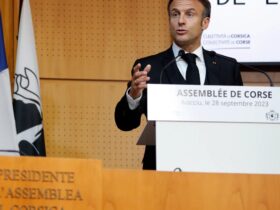
Many of you probably already know about this wonderful blog called The Duck of Minerva. If not, the next time you’re zoning out in class, I suggest you give this blogspot a little peruse (of course, not to take Glimpse from the Globe’s place in your heart).
But what you may not know, is that here at USC, we have an IR professor who is a regular contributor to The Duck. He focuses “on world politics from an academic perspective.” Our very own Professor Brian Rathbun (a.k.a. The Rath) has been writing for the blog since 2011; mostly pieces satirizing the IR profession and occasionally a piece about recent developments in world politics. Rathbun states that he “likes to understand something after it has happened” and doesn’t like to “prognosticate” current events (see Foreign Policy blogs for that). Unusual for a blogger, but a nice deviation from the norm in my opinion.
Rathbun divulged that what he likes about writing for The Duck of Minerva is that it’s something different. The material he writes for the blog can’t be published in an academic journal, and he claims “no one will read it if I put it on my website.” The Duck gives him a more creative outlet and a built-in reader-base. His most recent pieces include, “Nation’s international relations reference librarians despondent as Game of Thrones returns“, “Citing academic literature, NRA calls for proliferation of weapons for children of all ages,” and “International Relations Fetish on the Rise.” And we cannot forget to mention his series “Stuff Political Scientists Like.”
But when Professor Rathbun is not contributing his opinions to the blogosphere, you can find him working on his new book on the elements and processes of diplomacy. Branching off from his interest in cognitive psychology, Rathbun is taking a closer look at the “true choice” of the diplomat during negotiations. The inspiration for this topic came while his wife was working as a diplomat, prompting him to figure out why diplomacy is so important to the conduct of international relations. “Many theorists tend to view diplomacy very structurally; that is, if you’re powerful, you get what you want, and if you’re not powerful, you don’t get what you want.” But, Rathbun argues if that’s true, then you could stuck any two diplomats in a room and get the same outcome. But as we all know, that is not how it often works.
His other books include Partisan Interventions: European Party Politics and Peace Enforcement in the Balkans (Cornell University Press, 2004) and Trust in International Cooperation: The Creation of International Security Institutions and the Domestic Politics of American Multilateralism (Cambridge University Press, 2012). The former focuses on how the domestic political disputes regarding humanitarian intervention differed between the United Kingdom, France, and Germany. While the latter looks at partisan debates in the United States over the creation of international organizations, looking specifically at the League of Nations, the United Nations, and NATO.
So whether he’s poking fun at those of us who sometimes take IR a little too seriously or working hard on his eagerly anticipated new book–all while teaching at least two classes per semester–Professor Rathbun seems to be having a great time.
If you are interested in contacting Professor Rathbun, email him at brathbun@usc.edu or visit his office in VKC 330.
Prof. Rathbun teaches the following courses in Fall 2013:
IR 369 Contemporary European International Relations
IR 521 Introduction to Foreign Policy Analysis






